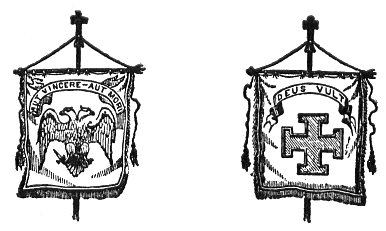“If there already exists a Lodge in any given town, the Knights of Illuminism must find means of establishing a more legitimate one; at least, they should spare no pains to gain the ascendancy in those which they find established, either to reform or to destroy them.” 15
“They must strongly exhort the members of our lodges not to frequent (without leave of their Superiors) any of those pretended constituted lodges, who hold nothing of the English but their diplomas, and some few symbols and ceremonies which they do not understand. All such Brethren are perfectly ignorant of true Masonry, of its grand object, and its real patrons. Though some of the greatest merit are to be found in such lodges, we nevertheless have strong reasons for not readily allowing them to visit ours.” 16
“Our Scotch Knights must pay great attention to the regularity of the subordinate lodges, and must above all things attend to the preparation of candidates. It is here that in a private intercourse they will show a man that they have probed him to the quick. Surprise him by some ensnaring question in order to observe whether he has any presence of mind. If he be not staunch to his principles, and should expose his weak side, make him feel how great his necessities are, and how necessary it is for him to be guided entirely by us.” 17
p. 466
“The Deputy Master of the Lodge (who is generally the auditor of the accounts) must also be a member of our Secret Chapter. He will persuade the lodges that they alone dispose of their funds; but he will take care to employ them according to the views of the Order. Should it at any time be necesssary to help one of our brethren, the proposition is made to the lodge; though the brother should not even be a Mason, no matter, some expedient must be found to carry the point.”
“No part of the capital, however, must in any case be alienated, that hereafter we may find the necessary funds for the most important undertakings. The tenth part of the subscriptions of these lodges must be annually carried to the Secret Chapter. The treasurer to whom these funds must be transmitted, shall collect them, and endeavour by all kinds of expedients to augment them.” 18
“But before any part of our own funds are appropriated to the help of any of our Brethren, every effort shall be made to procure the necessary succours from the funds belonging to lodges which do not pertain to our system.—In general, the money which these lodges spend in a useless manner, should be converted to the advancement of our grand object.” 19
“Whenever a learned Mason shall enter our Order, he must be put under the immediate direction of our Scotch Knights.” 20
From what code can Weishaupt, or his compiler Knigge, have selected such laws as these for their Scotch Knights? Many readers will be ready to answer, that they must have learned them from a Mandrin, a Cartouche, or some hero of the gibbet. But it is no such thing:—their own ingenuity was sufficient to invent such doctrines. Weishaupt lays down as a principle, that the end justifies the means: he made the application of it when he taught his adepts to rob the libraries of Princes and Religious Orders; his compiler Knigge applies the same principle to the funds of the honest Masons; and we shall soon see what use they made of those funds. It will be in vain for the Illuminee (more zealous for the honour of his founder than for that of the compiler Knigge) to object, that Weishaupt never approved of the degree of Scotch Knight. It is true, he never much admired it. But it is not the system of theft (evidently deduced from his own principles) that he reprobates; not a single expression in any of his letters can denote that he did so; for Knigge might have answered, what do those fools of Masons do with that money? just as Weishaupt had written what do those rascals of Monks do with their rare books? He blamed it not for its principles, but because he thought it a miserable composition: der elende Scottische ritter grade are the terms in which he expresses his contempt. When he corrected this degree, the thefts were not the parts which he expunged; they were too serviceable to the order. Weishaupt, however, consented to let this degree (such as it was) serve as a preparation for the mysteries of his Epoptes; that is to say, for his priests of Illuminism; and when considered in that light it may be truly said, that the Knights brigands were but pitiful and miserable indeed. I will, however, give the reader an opportunity of judging for himself.

Moe is the founder of GnosticWarrior.com. He is a father, husband, author, martial arts black belt, and an expert in Gnosticism, the occult, and esotericism.




